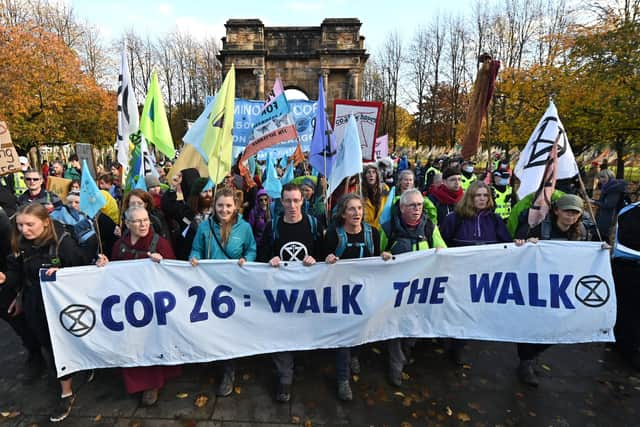COP26 climate summit: Cutting carbon emissions from transport is vital. But will public get the message about the need to be less selfish? – Alastair Dalton
Jennifer Morgan, executive director of Greenpeace International, told the BBC Newscast podcast: “Take one issue you really care about and follow it all the way through.”
Speaking to its presenter Adam Fleming, who, like me, admitted to feeling nervous about the sheer scale of the climate change conference, she added: “Don't try and understand absolutely everything.”
Advertisement
Hide AdAdvertisement
Hide AdThat was reassuring to hear, because transport alone will need to play a key role if the summit’s aims of reducing emissions to slow global temperature rises are to be achieved.
COP26’s organisers have pointed out that cars, lorries and other road traffic alone accounts for ten per cent of global emissions – and they are rising faster than those of any other sector.
In Scotland, transport produces more than one third of the country’s emissions, two-thirds of which is from roads.
According to the United Nations, the pace towards zero-emission vehicles, such as electric and hydrogen, must be significantly stepped up by “building consensus” internationally over the need to accelerate the process.
The UN wants a commitment to ending the sale of new petrol and diesel cars and vans in “advanced markets” by 2035 and worldwide by 2040.


However, a map on the conference website shows only eight European countries – including the UK – have signed up to that timescale, along with only California, Singapore and Cape Verde.
France and Spain have set a target of 2040, while the vast majority of the world’s land mass – and therefore most of its roads – are shaded an ominous grey on the map to indicate the lack of a speedy enough commitment to follow suit.
Transport is due to get its turn at COP26 on Wednesday. But unfortunately that will mean everyone in the sector speaking at the same time – with the risk that their individual messages won’t get widely covered, or they’ll drown each other out.
Advertisement
Hide AdAdvertisement
Hide AdIt’s already becoming like the Edinburgh Festival Fringe all on one day, and the event invitations are still flooding in.
I’ve been asked to events that cover everything from “smart canals”, electric Formula E motor racing, a hydrogen train, green shipping, zero-emission aviation, and “net-zero logistics” with the likes of John Lewis and Scottish Water.
I expect countless other organisations to offer comments on every conceivable aspect of transport and its part in fighting climate change.
All that, and more, is being staged in addition to whatever official announcements, events and speeches from the conference platforms.
But, being optimistic, perhaps the sheer volume of transport voices might get more people to realise that whatever governments do, they, as drivers, riders and passengers, are at the sharp end of making the changes needed.
If a coherent message emerges, it certainly needs to be heard, because people have to be less selfish about how they get about.
To give a small example, the tens of thousands of delegates are being encouraged to make emission-free journeys by travelling to COP26 by electric train or – free – electric shuttle bus.
Meantime, some drivers sat near the venues with engines idling, including several police vans – a glaring example of how the climate emergency has still to get through to everyone.
A message from the Editor:
Thank you for reading this article.
We're more reliant on your support than ever as the shift in consumer habits brought about by coronavirus impacts our advertisers.
If you haven't already, please consider supporting our trusted, fact-checked journalism by taking out a digital subscription.
Comments
Want to join the conversation? Please or to comment on this article.
